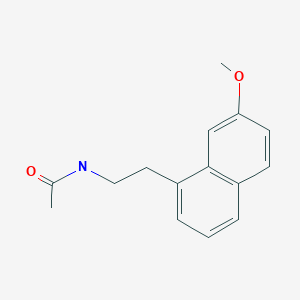Attribution Statement: LactMed is a registered trademark of the U.S. Department of Health and Human Services.
NCBI Bookshelf. A service of the National Library of Medicine, National Institutes of Health.
Drugs and Lactation Database (LactMed®) [Internet]. Bethesda (MD): National Institute of Child Health and Human Development; 2006-.
CASRN: 138112-76-2

Drug Levels and Effects
Summary of Use during Lactation
Agomelatine is not approved for marketing in the United States by the U.S. Food and Drug Administration (FDA), but is available in other countries. Some follow-up data reported possible drowsiness and developmental concerns in one infant, but no problems in 16 other breastfed infants. A minimal amount of information indicates that exposure and adverse effects can be avoided in breastfed infants if breastfeeding is held for 4 hours after a dose.
Drug Levels
Maternal Levels. A woman who was taking quetiapine 200 mg daily for postpartum psychosis had agomelatine 25 mg daily added after 1 week of therapy because of depressive symptoms. A mixture of fore- and hindmilk samples were collected 10 min before and 30, 60, 90, 120, and 240 minutes after each dose for the first 3 days of agomelatine therapy. Peak agomelatine milk levels of 0.78 to 2 mcg/L occurred at 60 to 120 minutes after the dose. On all 3 days, the milk concentration was undetectable (<0.1 mcg/L) at 240 minutes after the dose.[1]
Infant Levels. Relevant published information was not found as of the revision date.
Effects in Breastfed Infants
A woman with severe postpartum depression was given agomelatine 25 mg daily at bedtime. She breastfed her infant for 12 weeks, taking the dose after her last breastfeeding of the day and then pumping her milk in the morning before resuming breastfeeding. Her use of formula, if any, was not mentioned. She breastfed normally during the day. Her infant developed normally and had no abnormal laboratory values or adverse effects during the 12-week period.[2]
A prospective study followed 14 mothers taking agomelatine from birth and their 16 breastfed infants. The women were taking an average dose of 25 mg daily, with a range of 25 mg twice weekly to 50 mg daily. Infants were breastfed for an average of 7.4 months. Thirteen mothers did not report any short- or long-term adverse effects. One mother reported a possible adverse reaction of drowsiness in her baby in the first few weeks after birth which she attributed to agomelatine. She was taking agomelatine in an unspecified dose with duloxetine 90 mg daily and continued breastfeeding her baby until 9 months of age. She reported some developmental concerns of speech and low muscle tone in her baby who was 9 months of age at the time of follow-up.[3]
Effects on Lactation and Breastmilk
Relevant published information was not found as of the revision date.
Alternate Drugs to Consider
References
- 1.
- Schmidt FM, Lichtblau N, Uribe MM, et al. Agomelatine in breast milk. Int J Neuropsychopharmacol 2013;16:497-9. [PubMed: 22781637]
- 2.
- Xiao L. Agomelatine for postpartum depression and breastfeeding. Ther Adv Psychopharmacol 2021;11. [PMC free article: PMC8182171] [PubMed: 34158917]
- 3.
- Kwok S, Cupitt D, Kennedy D. Breastfeeding exposure to agomelatine – Preliminary findings from an Australian observational cohort study. Neurotoxicol Teratol 2023;98:16-7. doi:10.1016/j.ntt.2023.107222 [CrossRef]
Substance Identification
Substance Name
Agomelatine
CAS Registry Number
138112-76-2
Disclaimer: Information presented in this database is not meant as a substitute for professional judgment. You should consult your healthcare provider for breastfeeding advice related to your particular situation. The U.S. government does not warrant or assume any liability or responsibility for the accuracy or completeness of the information on this Site.
- User and Medical Advice Disclaimer
- Drugs and Lactation Database (LactMed) - Record Format
- LactMed - Database Creation and Peer Review Process
- Fact Sheet. Drugs and Lactation Database (LactMed)
- Drugs and Lactation Database (LactMed) - Glossary
- LactMed Selected References
- Drugs and Lactation Database (LactMed) - About Dietary Supplements
- Breastfeeding Links
- PMCPubMed Central citations
- PubChem SubstanceRelated PubChem Substances
- PubMedLinks to PubMed
- The novel melatonin agonist agomelatine (S20098) is an antagonist at 5-hydroxytryptamine2C receptors, blockade of which enhances the activity of frontocortical dopaminergic and adrenergic pathways.[J Pharmacol Exp Ther. 2003]The novel melatonin agonist agomelatine (S20098) is an antagonist at 5-hydroxytryptamine2C receptors, blockade of which enhances the activity of frontocortical dopaminergic and adrenergic pathways.Millan MJ, Gobert A, Lejeune F, Dekeyne A, Newman-Tancredi A, Pasteau V, Rivet JM, Cussac D. J Pharmacol Exp Ther. 2003 Sep; 306(3):954-64. Epub 2003 May 15.
- Review Moclobemide.[Drugs and Lactation Database (...]Review Moclobemide.. Drugs and Lactation Database (LactMed®). 2006
- Agomelatine: AGO 178, AGO178, S 20098.[Drugs R D. 2008]Agomelatine: AGO 178, AGO178, S 20098.. Drugs R D. 2008; 9(3):177-83.
- Review Agomelatine for the treatment of major depressive disorder.[Expert Opin Pharmacother. 2011]Review Agomelatine for the treatment of major depressive disorder.Carney RM, Shelton RC. Expert Opin Pharmacother. 2011 Oct; 12(15):2411-9.
- Review Sulpiride.[Drugs and Lactation Database (...]Review Sulpiride.. Drugs and Lactation Database (LactMed®). 2006
- Agomelatine - Drugs and Lactation Database (LactMed®)Agomelatine - Drugs and Lactation Database (LactMed®)
Your browsing activity is empty.
Activity recording is turned off.
See more...
